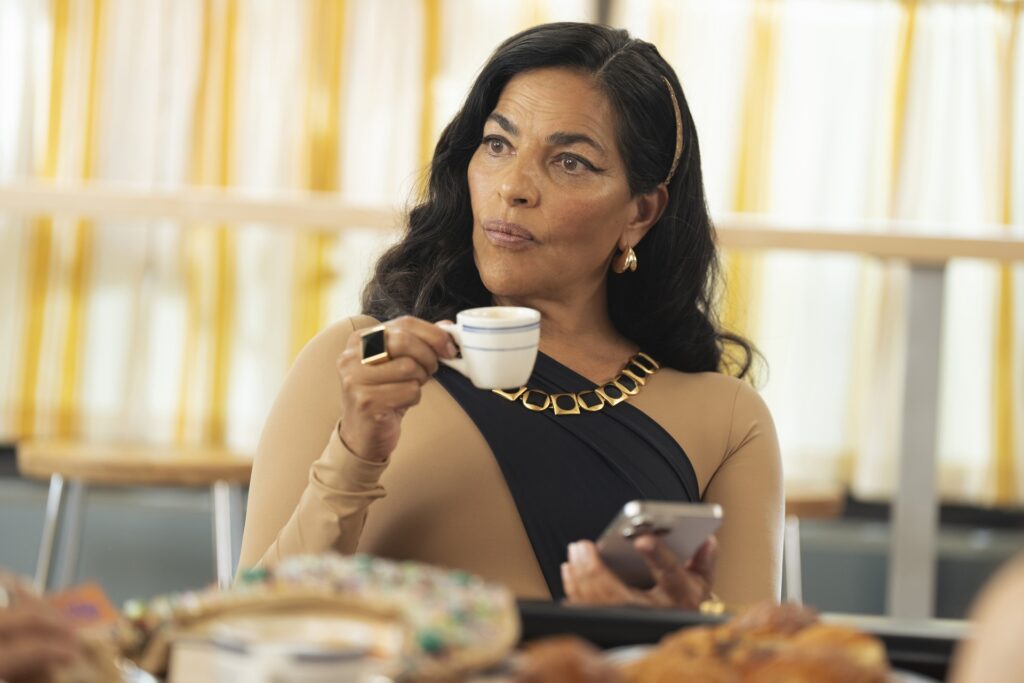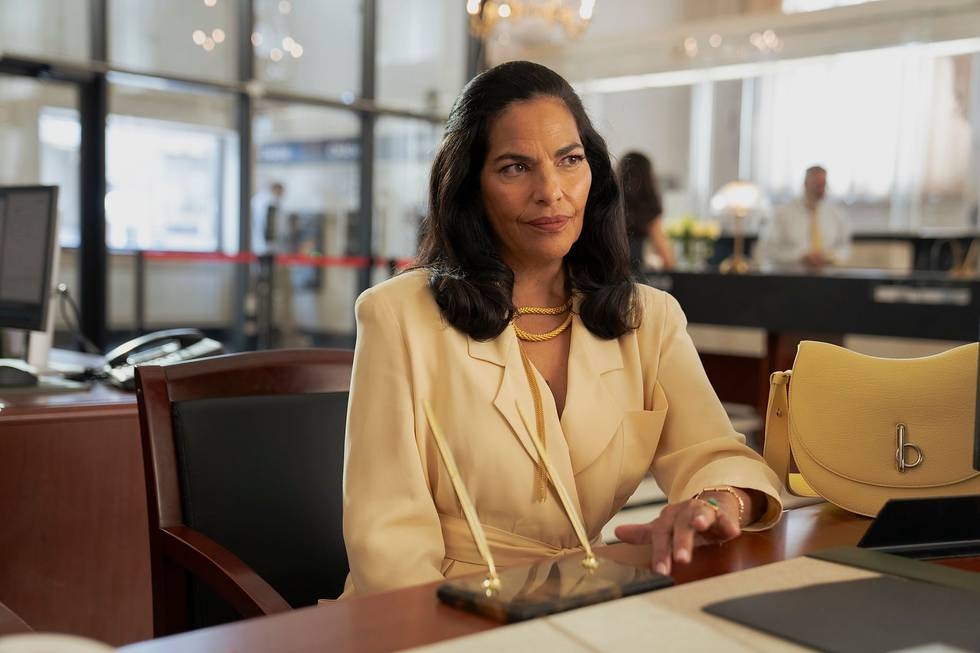When Sarita Choudhury joined And Just Like That…, she didn’t just land a part, she stepped into a cultural landmark. Assuming a central role within such a legacy is no small task, yet her portrayal of Seema Patel quickly emerged as one of the series’ most compelling additions. As Seema, she brings sharp wit, bold presence, and a kind of confidence that doesn’t ask permission. Choudhury made time during an afternoon walk in New York City to reflect on joining the Sex and the City universe, the balance between emotional realism and stylized fantasy, and how costume, cadence, and context helped her discover who Seema truly is.
How are you feeling about the response to season three so far?
“I don’t really read anything, I do know when we did the press, a lot of the journalists who had watched a few episodes seemed to be loving the season and saying it was very different.”
Yeah, I’m one of those people, by the way.
“You know, as I said it, was like, maybe she’s not.”
No, I really like it. I feel I’m not unique in saying that I grew up watching Sex and the City and that the show is such a formative piece of entertainment and pop culture. I do wonder what it’s like when you join a world like that? How did you feel when you got the role and walked onto the set for the first time?
“Sick. Horrible. Literally. You’re just like, ‘Why did they ask me? Why did I say yes?’ That’s what I felt.”
Yeah, because it is high stakes. You know how people are, they’re so attached to it, and it’s been this formative show.
“You know, when I did Homeland, we all were doing the first season and no one had a clue what it was going to be like. And that’s a whole other thing, because you’ve got this camaraderie at the beginning. But because I had watched Sex and the City, it felt a bit blasphemous.”
So, you were a fan going into this…
“I was a late fan because I didn’t have HBO back in the day, and there was no streaming. It was too expensive. Like if you had a TV, it’s because you moved into an apartment that had a TV. If you were in New York City hoping to be an artist, it was almost frowned upon to watch TV.”
I feel like the way that I consumed it—was through a full box set experience. And that was really how I watched it. It was one of those shows where you would buy the pink velvet box set and you would watch it over and over again.
“Exactly. It was so useful.”

It made you feel better. And that’s another thing I wanted to ask you about was that the characters are dealing with these serious topics and subverting norms for women all the time. But the show is also fantasy-driven and fun. How do you straddle those two aspects of the show?
“I think what you described was what I had to figure out with the help of Michael Patrick King, our showrunner, writer, and director. He’s kind of a genius and has a taste for this situational comedy that’s based on truth. And so a lot of it is in the writing and you learn as you go, and realize how important costumes, props are. People are fully doing things—they’re eating, having a drink, getting the waiter’s attention, and then a very important heartfelt confession is being made. And so that’s what I started to realize is that it’s like doing theatre. It’s like doing this kind of farce, but with this kind of normality to the truth of it, you know?”
Yeah, and it’s very intentional that people are aware, you know, we’re dealing with these serious topics and these emotional moments for the characters, but we still want it to be fun and fantasy for the audience.
“Well, because I think also, you know, in life, how many times I’m shocked that I would see myself, I always think I’m quieter than I am or I’m more pensive. But the amount of times I probably sound like a valley girl, you know, without even realizing how many times I shriek or I get excited with a friend. We’re actually more absurd than we realize, you know? I think the show puts that in and that’s kind of why we relate.”
Seema is very confident, ambitious, and bold. Do you feel like you ever walk off set and take that energy with you? Like you go about your day and sort of feel like her?
“I don’t know, because I’m sure some parts of it I do, like I definitely know now, you know, when I’m doing press and wearing high heels, there’s an ease for me that I never had before. And not only an ease, but something I like leaning into, which I never had before. I think it comes out in little physical ways—mentally, not as much.”

And if you’re having a blah day and you’re shooting, do you ever do anything to try to get into the Sema headspace?
“I think it starts when you go into your dressing room and the minute you see those outrageous outfits, the heels, the jewellery, the belt and then the gold cigarette case, you know how to work it. Within that hour-and-a-half, you naturally change. Those clothes kind of dominate.”
It’s sort of like a superhero’s outfit in a way.
“My god, yeah, that’s a nice thought.”
Has any of Seema’s style rubbed off on you in your real life? do your friends ever say you know, you’re dressing like her now?
“That’s funny. I would say the opposite. I think when you start wearing clothes like that and doing it every day, you can’t wait to be at home and just put on, you know, a flat pair of ballerinas and baggy jeans—you crave it.”
Since season one, I feel like Seema has really been a scene stealer and runaway fan favourite. She really has that fabulous essence that made everyone fall in love with the show when it first began. When you read the script for the first time, did you feel that way about her? And how do you think she’s changed from season one to season three?
“I could see her pace of talk in the script from the first episode I read. The kind of way she’s never regretful about what she says—she moves on. I could see no neurosis within even problems, which I found fascinating. But I think what was unsteady for me that season one was doing that, and hoping it still resonated. Because that can go wrong, and you could end up being brash—it was such a fine line.”
She really doesn’t land that way. You still feel like sympathetic to her, even though she has this quality where she says what is on her mind—it doesn’t make her neurotic at all. I think that’s why she’s quite likeable. How do you feel about the observation from many fans that parts of Sema feel similar to Samantha for them?
“When I read the script, of course, I didn’t see that because I’m just an actress reading words. So you’re not, and because she was in real estate and and just, you know, the first season dealt with her having this Indian mother and going to Diwali. There was no reason for me to to even think that.”

Do you live primarily in New York now?
“I do. There have been different periods of my life where i’ve lived in New York, but then everything I seem to shoot is somewhere else. So you’re away for a lot of the time. For some reason, the last two years, everything I shoot is in New York. And it’s funny, because I used to crave that years ago, and didn’t have it. And now I’m craving more travel. I’m now in New York all the time.”
This show feels like one of those things where New York City is a character on the show. How does that feel? Have you ever been part of anything like that before? what’s your lens for that being that you also live there?
“They will pick restaurants that are literally currently either popular or a chef is being talked about and they want that location—a lot of thought goes into it. And you feel it when you show up because they’re often places that I think I can’t even get into. When you’ve lived here a long time, I feel like certain streets remind you of an ex-boyfriend or, you know, they have these memories that you sometimes for certain years avoid a certain street. So when you’re shooting and you’re driving and you’re like, ‘my God, we’re gonna shoot outside that fire escape that I used to smoke and like cry on,’ that’s what’s amazing for me is. Because I myself wouldn’t be going to all these places right now in my life, you know?”
And the characters on the show do that. They’ve lived so many lives in that same city as well, which is a deeply relatable feeling for a lot of people.
“I love the whole storyline back in the day of Miranda moving to Brooklyn. We have to go to Brooklyn to see that whole thing of Brooklyn. And I remember I live in Brooklyn now. I remember when I moved to Brooklyn, I was like, no, no one’s going to visit me. I’m going to have to always trek into the city. And then that’s completely changed now. Every week, people just want to come to Brooklyn. And so it’s it’s so relatable.”
Yeah, it’s very magical and very unique to have a show that has spanned this many decades. Like that people are still talking about it, still doing interviews, still picking apart the characters, like still making dreams about it. just doesn’t, it almost never happens. Do you have a favourite episode from season three?
“It was a moment at a party where it was just a moment where I feel like Seema got to, in being Seema. Something changed, where it was pure emotion that came out as opposed to where she says something and moves along. Like she doesn’t often sit in a moment too long, and I had to sit in it, and it was just a great feeling as an actor to do, and I’ve never felt this where I feel like it’s weird for the character and that’s great, you know?”
And I also think that that is sort of what she’s like. And she is a character that doesn’t ruminate and doesn’t want to sit and stew in the emotions. Yeah.
“She doesn’t know what therapy is, you know what I mean?”
It is refreshing there’s so much therapy speak in our lives now, which is great in some ways, but it can, that can feel glib.
“Yeah, no, I know I keep thinking that if it wasn’t for therapy, so many people, including my friends, wouldn’t be where they’re at. But yet the language has become, like you said, somewhat overly therapy oriented. And thus that kind of irreverence and, you know, politically incorrect stuff that we secretly love. Seema gets to do quite a bit.”

And then unrelated to the show, what would you say when you’re not shooting a project, what does your dream day off look like?
“I mean, this is the thing when you live in New York, it kind of makes you appreciate the opposite, because I very much love water. So if I was anywhere, it would be to be at the ocean, and just swim all day and have a book. But New York is different. So in the summer in New York, I mean, my favourite thing is to get on a bicycle.”
Amazing.
“and especially an electric bicycle and like, you know, the fire hydrants that open and the water comes out and you get fully wet. And then you go sit on a bench somewhere and it dries so quickly. And then you do all those like, like that Spike Lee movie, you get the popsicle and you just hang out and stare at people. You’re so lazy. You’re so sweaty. I’m a real summer girl. So any day you ask me, it would be being hot.”
Has that been fun for shooting this season of And Just Like That…, where you’re like in the summer in New York?
“God, I’m not a winter girl. You’re wearing coats and layers, with stockings with high heels and also trying to not show that you’re cold, because some scenes you didn’t have a coat because you were running after your Birkin. It was so tricky for me as a person who doesn’t like the cold. So when I found out we were shooting in the summer, that was my first thought. I was like, ‘my God, I get to wear sleeveless things.’ I don’t have to wear tights. It was so exciting. Yeah.”
And Just Like That… is streaming on HBO and Crave.
This interview has been edited and condensed for clarity.

